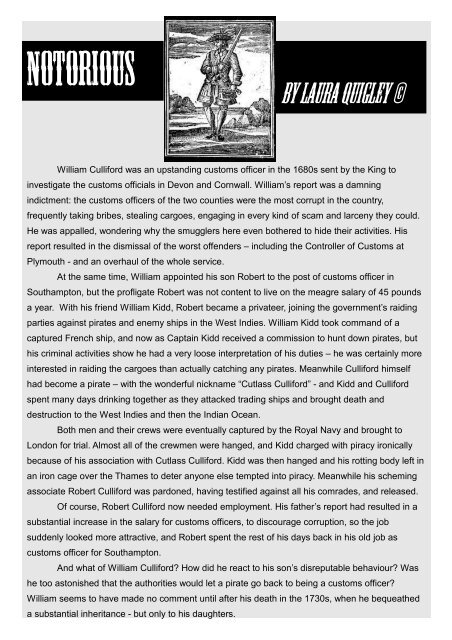Plymouthhistory
Create successful ePaper yourself
Turn your PDF publications into a flip-book with our unique Google optimized e-Paper software.
Notorious<br />
By Laura Quigley ©<br />
William Culliford was an upstanding customs officer in the 1680s sent by the King to<br />
investigate the customs officials in Devon and Cornwall. William’s report was a damning<br />
indictment: the customs officers of the two counties were the most corrupt in the country,<br />
frequently taking bribes, stealing cargoes, engaging in every kind of scam and larceny they could.<br />
He was appalled, wondering why the smugglers here even bothered to hide their activities. His<br />
report resulted in the dismissal of the worst offenders – including the Controller of Customs at<br />
Plymouth - and an overhaul of the whole service.<br />
At the same time, William appointed his son Robert to the post of customs officer in<br />
Southampton, but the profligate Robert was not content to live on the meagre salary of 45 pounds<br />
a year. With his friend William Kidd, Robert became a privateer, joining the government’s raiding<br />
parties against pirates and enemy ships in the West Indies. William Kidd took command of a<br />
captured French ship, and now as Captain Kidd received a commission to hunt down pirates, but<br />
his criminal activities show he had a very loose interpretation of his duties – he was certainly more<br />
interested in raiding the cargoes than actually catching any pirates. Meanwhile Culliford himself<br />
had become a pirate – with the wonderful nickname “Cutlass Culliford” - and Kidd and Culliford<br />
spent many days drinking together as they attacked trading ships and brought death and<br />
destruction to the West Indies and then the Indian Ocean.<br />
Both men and their crews were eventually captured by the Royal Navy and brought to<br />
London for trial. Almost all of the crewmen were hanged, and Kidd charged with piracy ironically<br />
because of his association with Cutlass Culliford. Kidd was then hanged and his rotting body left in<br />
an iron cage over the Thames to deter anyone else tempted into piracy. Meanwhile his scheming<br />
associate Robert Culliford was pardoned, having testified against all his comrades, and released.<br />
Of course, Robert Culliford now needed employment. His father’s report had resulted in a<br />
substantial increase in the salary for customs officers, to discourage corruption, so the job<br />
suddenly looked more attractive, and Robert spent the rest of his days back in his old job as<br />
customs officer for Southampton.<br />
And what of William Culliford? How did he react to his son’s disreputable behaviour? Was<br />
he too astonished that the authorities would let a pirate go back to being a customs officer?<br />
William seems to have made no comment until after his death in the 1730s, when he bequeathed<br />
a substantial inheritance - but only to his daughters.


